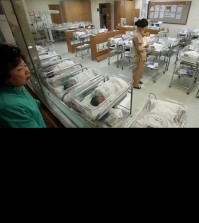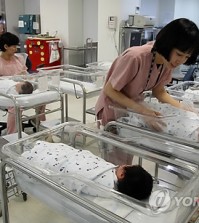- California Assembly OKs highest minimum wage in nation
- S. Korea unveils first graphic cigarette warnings
- US joins with South Korea, Japan in bid to deter North Korea
- LPGA golfer Chun In-gee finally back in action
- S. Korea won’t be top seed in final World Cup qualification round
- US men’s soccer misses 2nd straight Olympics
- US back on track in qualifying with 4-0 win over Guatemala
- High-intensity workout injuries spawn cottage industry
- CDC expands range of Zika mosquitoes into parts of Northeast
- Who knew? ‘The Walking Dead’ is helping families connect
Unification no answer to S. Korea’s low birth rate
(Yonhap) — Unification is no answer to South Korea’s problem of low birthrates because the event will rather bring down the fertility rate in North Korea than increasing the South’s, a U.S. demographic scholar said Monday.
Elizabeth Hervey Stephen, a Georgetown University professor, made the prediction during a presentation on South Korea’s demographic dividend at the Center for Strategic and International Studies (CSIS), citing what happened to Germany after unification.
South Korea is known for its low birthrate, with last year’s number standing at 1.19.
“If there is reunification, I can’t see that fertility is going to increase in South Korea. At anything, I think it will bring down (that of) North Korea,” she said in response to a question about how Korean unification would affect demographics.
She cited as an example the “birth shock” that East Germany went through after unification.
Before the 1990 reunification, the professor said, fertility in East Germany had been quite high because there were excellent facilities for children, an important factor that allowed mothers to go back to work when children were very young.
That kept fertility quite high in East Germany, whereas fertility in West Germany had been pretty low at around 1.5 babies per woman. But once there was reunification, the total fertility rate in East Germany dropped below that of West Germany, she said.
“In fact, it was down to historic lows about 0.9 children per woman,” Stephen said. “During times of uncertainties, the last thing people do is to have children. So i don’t think it’s going to be the answer to the demographic restructuring long term.”

















Stan
August 20, 2014 at 12:33 PM
I don’t understand. Folks – a low birth is GOOD. Stop thinking the other way around. High birth rates are leading to nothing good! Hello?!